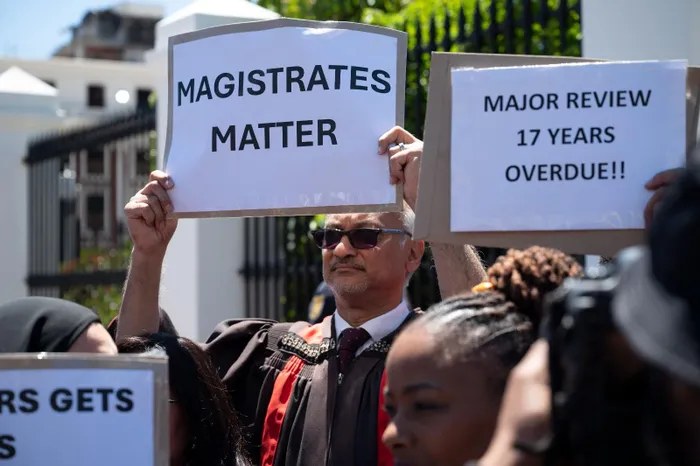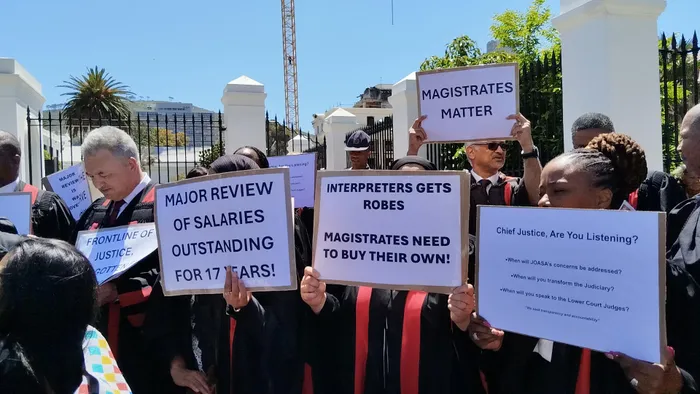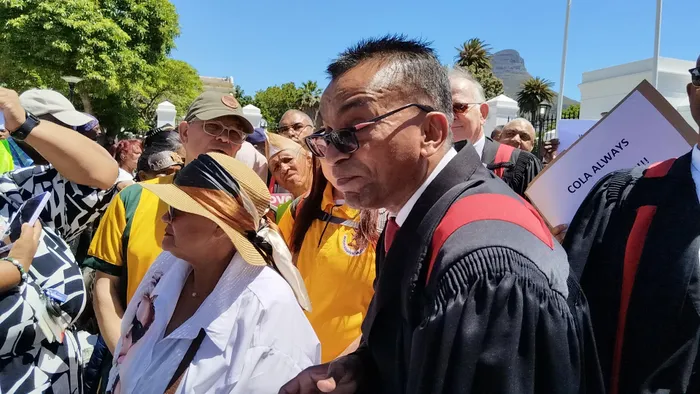
Western Cape magistrates marched to Parliament where they presented a memorandum demanding judicial reforms, improved salaries, and recognition as 'judges of the lower court'.
Image: Armand Hough / Independent Newspapers
Magistrates, who form a crucial part of the judicial system, face significant challenges that undermine their independence, financial security and overall well-being.
This was according to Judicial Officer's Association of South Africa (Joasa) Western Cape secretary, Rohan Roopnarian, as Western Cape magistrates marched to Parliament on Wednesday.
Joasa delivered a strongly-worded memorandum to the Presidency, demanding recognition as part of a 'single judiciary,' significant salary reforms, and better working conditions.
The magistrates marched to parliament to hold a Section 17 demonstration to highlight the plight of the lower court judiciary - the memorandum was received by Charles Ford, an official and representative of the Presidency.

Western Cape magistrates marched to Parliament in Cape Town on Wednesday, where they presented a memorandum to presidency representative Charles Ford demanding judicial reforms, improved salaries, and recognition as 'judges of the lower court'.
Image: Chevon Booysen
The delegation united in their call for a number of concerns which included the exclusion of magistrates from the judiciary and proposed a name change from magistrates to “judges of the lower court” to reflect their role more accurately.

The Section 17 demonstration highlighted the growing dissatisfaction within South Africa's magistracy about their status and working conditions. Judicial Officer's Association of South Africa (Joasa) secretary, Rohan Roopnarian read out the memorandum.
Image: Chevon Booysen
Roopnarian said delays in making recommendations and implementing salary adjustments have eroded judges of the lower courts' financial security.
They also called for a salary for life and or a separate pension fund for magistrates.
“The lack of benefits in line with those of other office bearers include for example official vehicles, petrol cards, tax rebates, spouses benefits, travel, housing, entertainment and medical aid.
“The amendment of the actuarial formula has detrimentally affected magistrates' pension benefits which is in breach of the legislative provision that magistrates' remuneration may not be reduced except by an Act of parliament,” said Roopnarian.
The magistrates highlighted that their independence was compromised as they are forced to remain within the Government Employees Pension Fund (GEPF) which “directly conflicts with their independence and creates a perception of bias”.
The magistrates called for a platform to be established where regular dialogue can take place between magistrates, the chief justice, the Magistrates Commission and the Ministry of Justice to address concerns and improve working conditions.
Accepting the memorandum, Ford said: “My role is to make sure that we do get it into our processing and make sure it gets to the president’s desk.
“It will take between four to six weeks to get a reply. That is the administrative process that we do. In terms of responding to (the memorandum), I won’t do that now,” said Ford.
Terrence Manase, the spokesperson for the Minister of Justice and Constitutional Development, said significant progress has been made toward placing the Judiciary on a path to full institutional independence.
Manase said a task team comprising representatives from the Department of Justice and Constitutional Development, the Office of the Chief Justice, the Presidency, National Treasury, the Department of Public Service and Administration, and the Department of Public Works and Infrastructure has been established to finalise proposals that will fully realise the Judiciary’s institutional independence.
"A progress report on this work has already been prepared for submission to Cabinet. Matters relating to the magistracy, including resourcing and conditions of service, form part of these ongoing discussions. A meeting on these specific issues is scheduled for early November to ensure further engagement and progress on the concerns raised," said Manase.
According to the Democratic Governance and Rights Unit’s (DGRU) 2022 survey of South African Magistrates’ Perceptions of their Work Environment, key findings indicated that the magistracy was under increasing pressure, both from within and outside it.
Magistrates' Matter, noted: “Reported working hours remain very high for some magistrates but not for others, with time in court taking up the bulk of their time. This must be reconciled with court hours data, which should be carefully scrutinised and disaggregated to better identify the courts and magistrates under pressure. Most magistrates continue to report being under a great deal of stress, with the vast majority reporting multiple symptoms of stress.
“Remuneration and benefits, court infrastructure and resources, morale in the magistracy, and ability to attract and retain the best people, were most likely to be identified as major issues in the magistracy. Remuneration, benefits, and career pathways were identified as key to retaining skills in the magistracy, while opportunities for career progression and mental health support were highly likely to be identified as important.”
Related Topics: